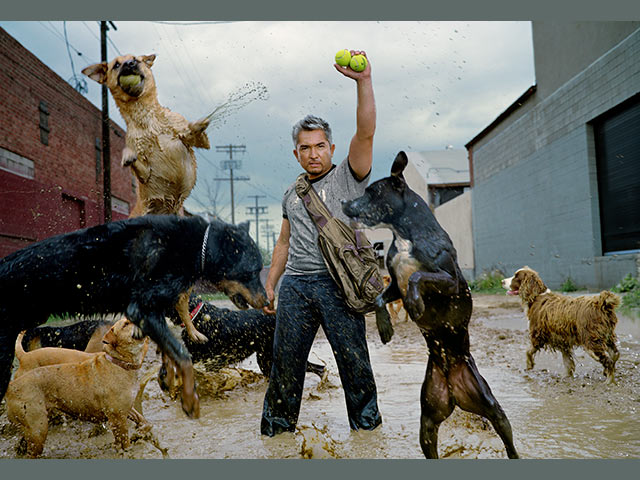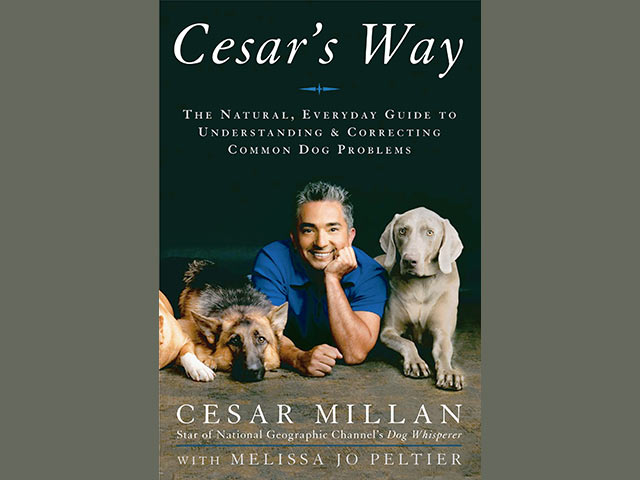Cesar Nation


Healthy Leaders
Growing up in rural Mexico, Millan saw people use force to make dogs submit to human control. He understood early on that this was wrong. "From the very beginning of my life, dogs were always important to me. I tried to develop this instinct to know how to be with them, how to gain their trust and respect so they would gain mine. I never asked them to do anything I was not willing to do and give back to them 100%."
It worked. Packs of feral dogs eagerly followed him and obeyed his commands. To Millan, "This was paradise." On the downside, it made him a loner and earned him teasing nicknames from his peers. "They called me 'perrero,' which kind of means 'someone who smells like dogs.' But that didn't bother me. I had a total bond with Mother Nature."
Millan admits that his ability to lead dogs relies on talents he was born with. As an adolescent, he realized there was more than instinct to human-dog bonding. "It's not just about being nice to the animals. When you see a mother dog with her puppies, she doesn't get excited and scream, 'Hi babies!' She establishes rules and boundaries and limitations. That's the role we have to create – the authority, the pack leader."
Millan says the pack leader concept is often misunderstood. People waver between a fear of being too harsh, or too soft, with their dogs. Either way, Millan says it can create a sense of instability, a disservice to our dogs. To illustrate the proper kind of emotional, respectful bond we should have with our dogs, Millan gives a human analogy: "If you're driving in your car and you break the rules, a pack leader comes along and gives you a ticket. If that pack leader treats you with calm, assertive respect, that's good leadership. But if that pack leader has a personal thing going on, and gets angry and abusive, or if that leader doesn't tell you what you need to do, you feel unsafe or confused. It's just like that with dogs. You have to be strong, but don't create nervousness, anxiety, or fear. If you do that, it's not discipline. It's punishment. In nature, alphas discipline, but they don't punish, and they don't get frustrated or angry."
This all comes to Millan naturally, but he stresses that anyone can learn, unless you are dealing with a dog that has dangerous aggression problems. He says the first step is to allow a dog to come to you rather than overpowering the animal. "I always teach kids to let the dog approach you. That makes you the pack leader. The dog is following you. People are all about ears, then eyes, then conversation. Dogs are all about smell. When a dog wants to smell you, let it happen. Let them finish. That let's the dog read your energy, which is all they know about."
Sometimes, effective leadership involves what people should not do. Here, Millan's advice becomes difficult for many modern dog owners. "I love that in America people are becoming more humane to dogs. But I don't love that we're turning dogs into humans." Millan cites several specific problems most people are familiar with: letting dogs sleep with us, allowing dogs to walk through a door before people, and letting dogs pull ahead of us on leash.
Millan does not deny the appeal of cuddling in bed with his Rottweiler. The problem, he believes, is that it makes humans and dogs appear as equals. "Who is the leader there? This can cause frustration for humans later on when they need to lead. It can also cause stress for dogs because there is inconsistent, unbalanced leadership in the pack."
Whispering Across the Nation
Except for the most extreme cases, Millan believes all dogs slated for euthanasia in shelters because of behavioral problems can be rehabilitated. Capitalizing on his "Dog Whisperer" success, Millan and his wife established the Cesar and Ilusion Millan Foundation, which raises money for dog shelters nationally. Their mission goes beyond training, Millan says. "We've done a lot of harm to Mother Nature. We have so many dogs in shelters. We create them, then we kill them when there are problems, just because it's the easiest thing to do. We'd be better off if we kept these dogs alive and learned something from them."
That sentiment is behind Millan's most ambitious project – a nationwide network of "dog sanctuaries." Still in the distance, his goal is a center in every state of the country, where even the most troubled dogs can be trained, and saved from euthanasia. To make it happen, Millan says many more people who understand dog psychology are needed, people who have that natural ability to be effective pack leaders. For the psychology centers to become a reality, Millan appeals to future dog trainers to join him. "We want to hear from all those kids and adults out there who want to make a difference. We need them to be pack leaders who will work in every sanctuary."
The sanctuaries would not only rehabilitate dogs. They would also train humans. Without that, the mission fails. Laughing, Millan says, "With dogs, we can turn them around in days. But with humans, we have to be more patient! That can sometimes take years."
